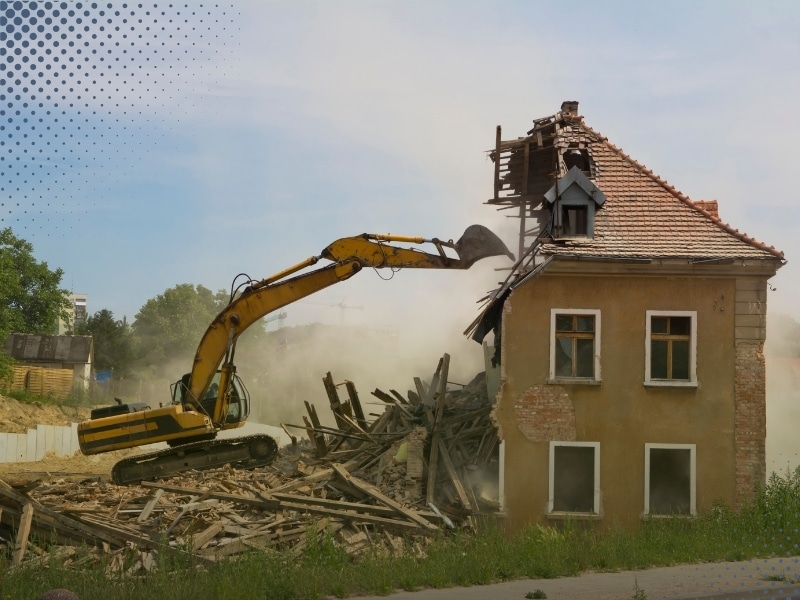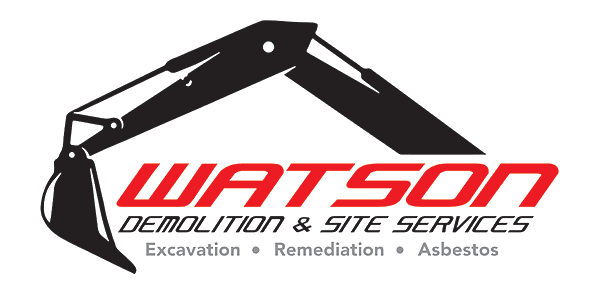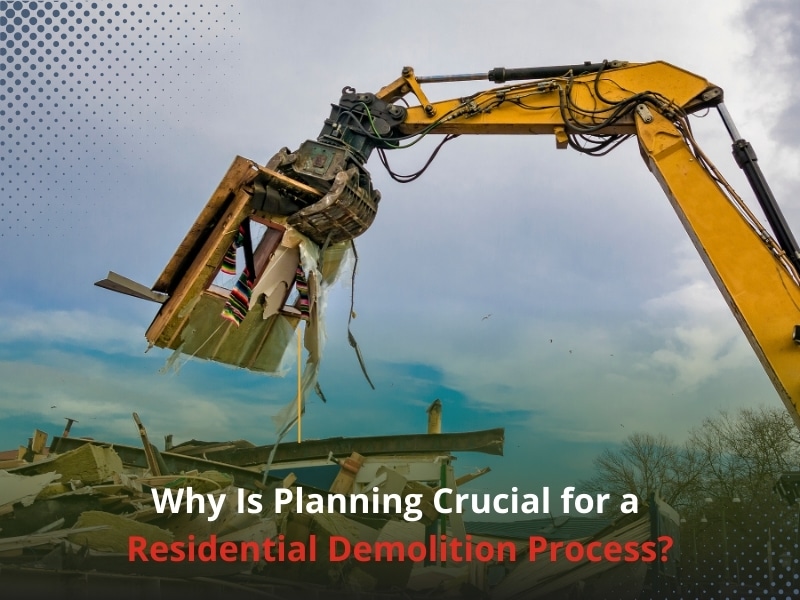Planning is a critical aspect of the residential demolition process. Whether you’re upgrading your home, clearing land for a new project, or just removing an old structure, a well-thought-out plan ensures a smoother, safer, and more cost-effective demolition. In this guide, we’ll explore why meticulous planning is indispensable for a successful residential demolition and provide insights into the key steps involved.
What is the first step in a residential demolition process?
The initial step in the residential demolition process involves thorough planning and assessment. Here’s a quick rundown:
- Assessment of the property: Before any demolition work begins, it’s crucial to conduct a comprehensive assessment of the property. This includes evaluating the structure, identifying hazardous materials, and understanding the layout.
- Consultation with professionals: Engaging with demolition experts and structural engineers will help you understand the specific requirements of your project. They can provide valuable advice on the safest and most efficient methods of demolition.
- Creating a detailed plan: This plan should outline the scope of work, the demolition methods to be used, and the safety protocols. It should also address waste management and recycling procedures.
How does a detailed plan ensure a safe residential demolition?

A detailed plan is essential for maintaining safety throughout the residential demolition process. Here’s how:
- Identifying hazards: A thorough plan helps identify potential hazards, such as the presence of asbestos or structural weaknesses, allowing for appropriate safety measures.
- Safety protocols: Detailed plans include safety protocols and procedures to protect workers and nearby residents. This might involve setting up barriers, using safety gear, and ensuring proper training for all involved.
- Emergency procedures: Having a plan in place ensures that there are clear emergency procedures, should an unexpected situation arise. This can be critical for avoiding accidents and managing any issues promptly.
Why should you obtain the necessary permits before starting the residential demolition?
Obtaining the necessary permits is a crucial step in the residential demolition process for several reasons:
- Compliance with regulations: Permits ensure that your demolition project complies with local regulations and building codes. This helps avoid legal issues and potential fines.
- Environmental protection: Certain permits may be required to manage and dispose of hazardous materials like asbestos. This helps protect the environment and public health.
- Avoiding delays: Securing permits in advance can prevent delays caused by regulatory issues or last-minute changes. It ensures that the project proceeds smoothly without interruptions.
For more detailed information on building regulations, refer to the government’s guide on building regulations.
How can planning help you avoid costly mistakes during residential demolition?
Effective planning is key to avoiding costly mistakes in the residential demolition process. Here’s how:
- Accurate budgeting: A detailed plan helps in creating a realistic budget by accounting for all aspects of the demolition, including labour, equipment, and disposal costs. This helps avoid unexpected expenses.
- Resource allocation: Proper planning ensures that resources, including manpower and machinery, are allocated efficiently. This can prevent unnecessary costs associated with delays or inadequate resources.
- Contingency planning: A well-thought-out plan includes contingency measures for unforeseen issues, such as discovering hidden structural problems or encountering difficult weather conditions.
What role does environmental consideration play in residential demolition?
Environmental considerations are crucial in the residential demolition process for the following reasons:
- Waste management: Planning for the proper disposal or recycling of demolition waste helps minimise environmental impact. This includes segregating materials like metals, wood, and concrete for recycling.
- Hazardous materials: Identifying and safely managing hazardous materials such as asbestos or lead is vital. This protects both the environment and public health.
- Noise and dust control: Implementing measures to control noise and dust during demolition helps reduce disruption to the surrounding area and contributes to environmental protection.
How does planning influence the timeline of your residential demolition project?

Planning significantly impacts the timeline of demolition of a house or residential demolition process:
- Project scheduling: A detailed plan includes a timeline for each phase of the demolition, from preparation to completion. This helps ensure that the project stays on track and is completed within the desired timeframe.
- Coordination: Effective planning facilitates better coordination among contractors, suppliers, and other stakeholders. This can prevent delays caused by miscommunication or scheduling conflicts.
- Efficiency: A well-structured plan ensures that tasks are carried out efficiently, reducing the overall time required for the demolition process.
Why it’s essential to choose the right contractor
Choosing the right contractor is crucial for a successful residential demolition process. Here’s why:
- Experience and expertise: An experienced contractor will have the knowledge and skills necessary to handle various aspects of the demolition, including handling hazardous materials and managing complex projects.
- Safety record: A reputable contractor will have a strong safety record and follow industry best practices. This ensures that the demolition is carried out safely and in compliance with regulations.
- Customer service: Good contractors provide clear communication, timely updates, and excellent customer service. This helps ensure a smooth and stress-free demolition process.
Conclusion
Effective planning is indispensable for a successful residential demolition process. Thoroughly assessing the property helps identify potential hazards and develop a comprehensive plan tailored to your project’s needs. Obtaining the necessary permits ensures compliance with local regulations and prevents legal issues while considering environmental factors helps manage waste and minimise the project’s impact on the surroundings.
Choosing the right contractor is crucial, as their experience and expertise greatly influence the safety and efficiency of the demolition. Focusing on these key aspects ensures a demolition that is both effective and cost-efficient, paving the way for a smoother transition to your next project.
Ready to start your demolition project?
If you’re embarking on a residential demolition project, make sure to plan thoroughly to avoid pitfalls and achieve the best results. For expert advice and professional services, contact Watson Demolition & Site Services for a free quote or consultation.
Planning ensures that your project runs smoothly and efficiently. Don’t leave it to chance—get in touch with Watson Demolition & Site Services to discuss your demolition needs today.

